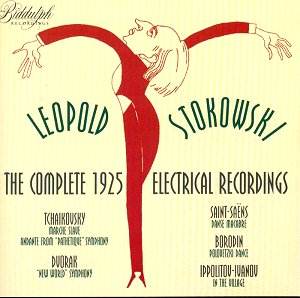Stokowski first recorded in 1917 but technological
advances in the early 1920s meant his attitude to the acoustical
system had somewhat softened by the time that electrical recording
became a commercial reality. This disc collates an eight-month
period of recording in 1925, all electrically recorded, and all
bearing the mark of practical bet-hedging with regard to the properties
of the new method. As was fairly common practice for a few years
the bass line was reinforced; collectors are well used to the
double bass line being reinforced by tubas but Edward Johnson
in his elegantly candid sleeve notes quotes the Victor session
sheets in their deposition of the orchestra – no double basses
at all in the Borodin and Saint-Saëns, instead, amazingly,
a bass saxophone substitute (had Victor learned from their brass
and jazz recordings that the bass saxophone could profitably thicken
the orchestral texture?) In addition the timpani here was replaced
by a double bassoon. The compromises inherent are noticeable throughout
the disc and therefore this can’t realistically be said to be
a genuinely embryonic Philadelphia sound on disc, not least because
the string complement was drastically reduced pretty much in accordance
with proto-acoustic recording balances. Still, as a slice of technology
in action it’s most revealing and given that it’s Stokowski on
the rostrum never without interest.
The good news is that Biddulph have used fine
sounding Victors and Mark Obert-Thorn has transferred them without
fuss. In the Saint-Saëns violin fanciers can crane to hear
the long time concertmaster of the orchestra, the stentorianly
named Thaddeus Rich, who otherwise only recorded four 78 sides
for Okeh. The Borodin is an abridgement – orchestra only – from
the last of the Polovtsian Dances. This and the Ippolitov-Ivanov
were of course staples of Stokowski’s performing career – though
the latter was only returned to on disc in 1947 with the NYPSO.
The colouristic and exotic qualities of the music are obviously
rendered problematic by the orchestral limitations
and by the rather dull sounding recording. The strings have a
chance to show their flexibility and weight in the Tchaikovsky,
even if dogged by brass bass line impedimenta. The meat of the
disc is the December 1925 recording of the Dvořák New World,
a work Stokowski recorded six times in total. The relatively unsatisfactory
nature of the recording and the rapidity with which studio engineers
gained a relative degree of mastery over it necessitated a remake
almost immediately in 1927. The other recordings were again in
Philadelphia in 1934, the All-American Symphony in 1940, His Symphony
in 1947 and finally nearly thirty years later in London with the
New Philharmonia. In 1925 there are powerful portamenti, expressive
diminuendos, idiosyncratic touches and a strongly etched personality
controlling the music making. But the recording all too faithfully
picks up the lugubriously heavy substitute bass instruments –
the counterpoint of filigree strings and stygian tubas was a little
too much even for me, and I’m a notorious admirer of the acoustic
era Stroh violin (the one that attached a mini horn to the fiddle
to direct the sound). I’d stick with Stokowski’s 1927 or 1934
Philadelphia recordings.
Still, a rather fascinating slice of Stokowski’s
musical life on record, preserved in excellent sound given the
inherent limitations of poor acoustic venues and compromised orchestral
balances. I’m glad I’ve heard these early electrics.
Jonathan Woolf
